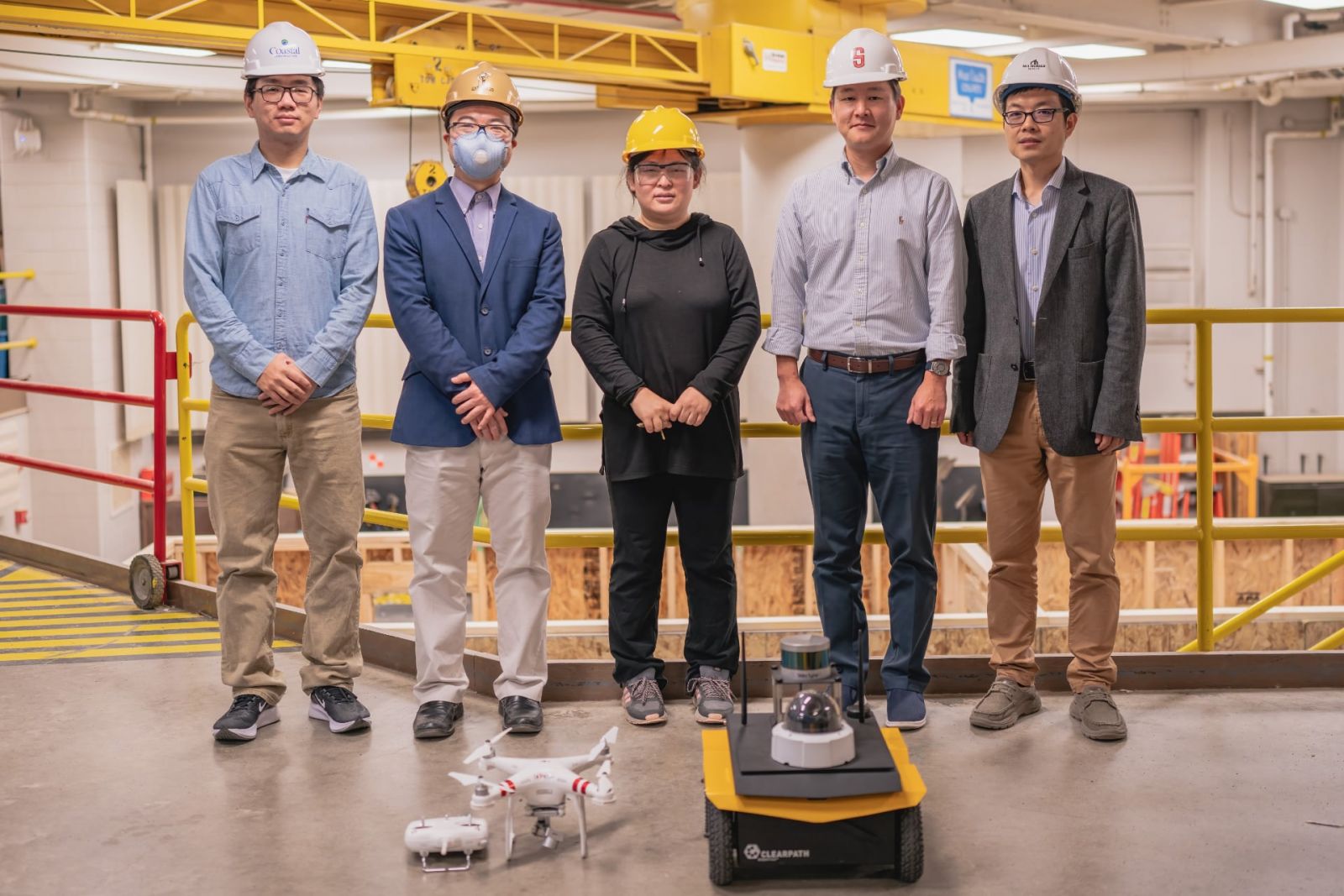
Five professors in Purdue University’s Polytechnic Institute received National Science Foundation (NSF) funding for research into collaboration between teams of human workers and robot workers at construction sites.
Jin Wei-Kocsis, associate professor of computer and information technology, is the principal investigator. Jiansong Zhang, assistant professor of construction management technology, Byung-Cheol “B.C.” Min, associate professor of computer and information technology, Mesut Akdere, professor of human resource development, and Dongming Gan, assistant professor of engineering technology, are co-principal investigators.
The researchers aim to create a collaboration framework for multiple human workers to team with multiple remote construction robots of various types. These human-robot teams have the potential to improve operational efficiency and scalability and thus anticipate imminent problems challenging the future of the construction industry, including a shortage of skilled labor, an aging workforce, occupational safety challenges, and stagnant productivity, according to the researchers.
“Our interdisciplinary team was formed in early 2020, and we have been working steadily toward a successful research proposal,” said Wei-Kocsis, “so this award means a lot to us.”
The NSF’s $150,000 award serves as a development/planning grant in support of preliminary research for one year.
“The grant can also serve as a big support and foundation for subsequent larger research projects of up to five years and $4 million within the same NSF program,” Wei-Kocsis said. “In other words, our team can be one step closer to a larger grant based on this project.”
Realizing the best outcomes will require new approaches for human-robot collaborative operations in constrained and complex construction workplaces, the research team said, but potential benefits to the nation are significant, given the critical economic and societal roles of the construction industry.
The research team will develop a proof-of-concept worker-in-the-loop interface to support preliminary studies with industry partners at construction sites with varying work environments and operation scenarios. The preliminary studies will be supported by workshops, focus groups, training sessions and surveys. Expected outcomes of the project include improvements to work efficiency, overall work productivity, worker safety and well-being, and recruitment and inclusion of a diverse workforce, including older workers.
The project ultimately has potential benefits for the fields of construction engineering, artificial intelligence, robotics, learning sciences, and workforce training, as well as architecture, engineering, construction, and human and social science, the research team said.
Using the NSF grant, the Purdue team aims to build an interdisciplinary team of academic researchers and industry stakeholders with a deep understanding of the applicability and potential of multi-human-multi-remote-robot (MHMRR) collaboration. Their goal is to build an interactive MHMRR collaboration framework with Avatar Construction Workers able to collaborate with remote heterogeneous construction robots through transparent and reliable on-site knowledge transfer.
To achieve this goal, they will conduct two project development activities. First, the research team will build a prototype of a worker-in-the-loop MHMRR interface that is reconfigurable for various construction operations and integration of different new and emerging technologies. Second, the research team will draw upon partnerships with relevant stakeholders in both the construction and technology industries to design and conduct preliminary studies of MHMRR collaborations under a representative selection of realistic conditions.
Experimental design and recruitment of additional partners will be accomplished through multiple activities, including workshops, focus groups, training sessions, and surveys. Project development activities supported by this award will result in the formation of an integrated team including academic researchers, engaged industry partners, specialized research infrastructure, a foundation of supporting preliminary results, and a research agenda tailored to advancing the critical field of MHMRR for construction.
The research team said the outcome has the potential to revolutionize existing construction industries and to provide convergent solutions for technical and workforce bottlenecks.
Yifu Wu, graduate research assistant in the Department of Computer and Information Technology, is working closely with the research team to develop the prototype of the MHMRR interface and to evaluate the performance of the interface prototype in both lab and field experiments.
The NSF is supporting the research as a Future of Work at the Human Technology Frontier (FW-HTF-P) project. FW-HTF-P projects examine the interaction of technology and people in the workplace, with a focus on the design of intelligent technologies and work organization that improves the quality of work, ensures worker safety, and enhances societal impact.
Additional information
- Interactive Multi-Human Multi-Remote-Robot Operations for the Future of Construction Work (National Science Foundation award abstract #2222838)
- Future of Work at the Human-Technology Frontier: Core Research (FW-HTF) (National Science Foundation)
- Zhang investigating BIM technology to automate building code compliance-checking, modular construction
- Construction management professor adds better eyes to hands of construction robots
